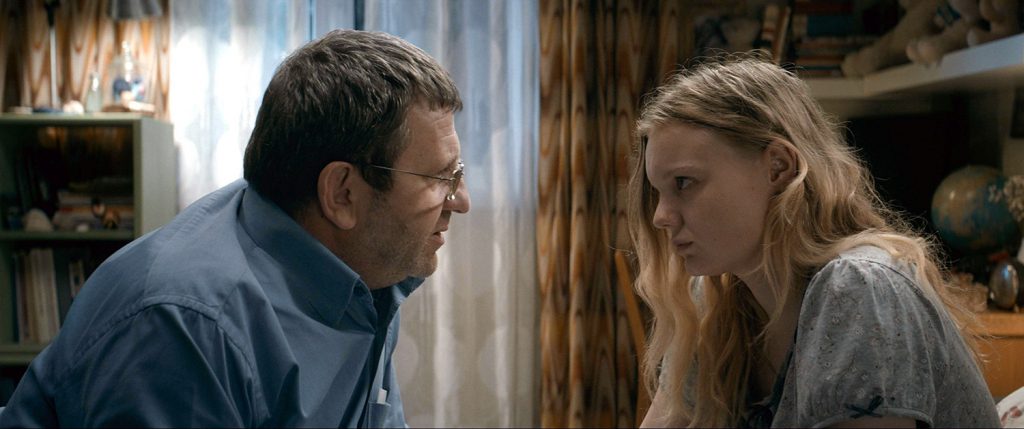
GRADUATION (Bacalaureat)
Sundance Selects
Director: Christian Mungiu
Written by: Christian Mungiu
Cast: Adrian Titieni, Maria Dragus, Lia Bugnar, Malina Manovici, Vlad Ivanov, Gelu Colceag
Screened at: Dolby24, NYC, 3/15/17
Opens: April 7, 2017
If Christian Mungiu believes that corruption in government and dysfunction in society are unique to Romania, he is wrong. If he believes that only politicians in Romania lie, I’m guessing that he’s wrong again. But of course he is not naïve, and presumably he believes that the hanky-panky going on in his Eastern Europe country knows no boundaries. That’s what makes “Graduation” universal in its truths.
Recall that Mungiu’s masterwork, “4 Months, 3 Weeks and 2 days,” which focused on the opportunism of the then Communist government’s ban on abortion, showed not only what happens when women go to metaphoric back alleys as they inevitably will where abortion is illegal but also what takes place when an ideological frame of mind clashes with the realities of human nature. And that’s why hard-line Communism has failed and is generally despised everywhere that major social engineering has been invoked.
The people of Romania now are free of Communism legally but still harbor a mind-set today that has been carried over from the bad years of the Ceausecui government which lasted from 1967 to 1989. Money is delivered under the table, illegal deals are made accordingly, and society suffers. To afford us a physical look at a society’s soullessness, Mungiu gives us a car-eye view of the ugliness of the landscape, not in Bucharest but in the small Transylvanion town where the first thing you may think of when you see the construction is that this must have been planned by Communist bureaucrats.
The principal character, forty-nine year old thick-set Dr. Romeo Aldea (Adrian Titieni) lives with his phlegmatic wife Magda (Lia Bugnar) and seventeen-year-old brilliant daughter Eliza (Maria Dragus). On the way to school Eliza fights off a rapist, her injury treated by a cast on the arm. But she is traumatized days before taking the most important exam in her life: one that can ratify a scholarship she won for a university in the UK. Her father, who had left Romania when it was Communist but returned to his regret, will do anything to give the young woman a start in life in the UK which he considers “civilized” when compared to his own country. He arranges deals by which Vice Mayor Bulai (Petre Ciubotaru), needing a liver transplant to save his life, is kicked to the top of the waiting list and, in return, Eliza will be graded by a teacher who “leniency” has been bought.
Heading a family whose dysfunction could be called a metaphor for the whole society, Romeo Aldea, who receives a meager salary from his hospital, has been openly carrying on an affair with a teacher, Sandra (Malina Manovici), though you can’t blame him given the sloth-like character of his miserable wife.
Mangiu, who received the award at Cannes for Best Director, successfully shows us the struggle between those who will do anything go achieve their goals and to hell with society, and those who would prefer to stay ethical even frustrating those goals. Despite his disgust with Romanian society, Dr. Aldrea is contributing to that dysfunction by his wheeling and dealing, even when his daughter shows that she would rather remain in their crummy little town as long as the rules are followed. When the small son of his girlfriend throws rocks in a playground when kids broke into his line, the doctor, who is minding him for a few hours, has to explain why you don’t take such actions even to counter illegal activities. The boy wants to know why the other kid’s behavior should be tolerated, since aren’t we supposed to play by the rules? The doctor, by agreeing with young Matei (David Hodorog) of course demonstrates his hypocrisy to the movie audience.
Behind the lens, Tudor Vladimar Panduru manipulates a hand-held camera to give the film immediacy while at the same time capturing the ugliness of the landscape. Acting is superb, and the though the screenplay by the director is stronger on dialogue than on physical action, the over two-hours pass quickly.
Unrated. 128 minutes. © Harvey Karten, Member, New York Film Critics Online
Comments, readers? Agree? Disagree? Why?
Story – B+
Acting – A-
Technical A –
Overall – B+





